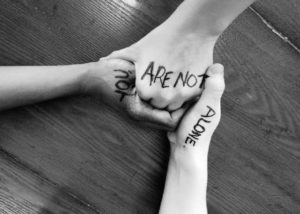“I haven’t been seeing you at church lately. Is everything okay?”
“I’ve been depressed, so I was avoiding people. I didn’t want to answer any questions.”
I could say that to my friend because she’s familiar with this struggle. I knew there would only be empathy in her, so I could tell the truth instead of living the “everything is fine” lie for a few minutes. I mean, most of the time I am fine. I feel good. I’m generally happy. I have a good life. But there are times when my body and my brain betray me and I sink into The Bad Place, from which I have to claw my way back out.
This time wasn’t a full visit to The Bad Place. It was standing on the edge of it and looking in while firmly grasping the guard rail. Nevertheless, whether I’m fully immersed or teetering on the precipice, it sucks. Mental illness is a thief. It steals from me on a regular basis. It steals my joy and my happiness. It steals my desire to do pretty much anything. It replaces those precious feelings with emptiness, isolation, and misery. Mental illness is also a liar. It tells me I have no value; that I’ll always be alone; that I am unloveable; that I am not enough.
There’s a good chance that if you know me in real life and you’re reading this, you didn’t know that I am one of the 20% of Americans with mental health issues. I’m really good at hiding it. I can give an Oscar caliber performance in the Everything Is Fine role. There are people in my life that know about my struggle, but I generally don’t broadcast it for public consumption. People can be cruel, either on purpose or out of ignorance, so I am selective in whom I tell.

I’ve been diagnosed with Major Depressive Disorder (or clinical depression), Generalized Anxiety Disorder, and Panic Disorder (I was also diagnosed with an eating disorder, but that is also a story for another day). My brain is sometimes a twisted landscape of wonky chemistry, poor genes, and the leftover effects of a really effed up childhood. There has been some talk about me possibly having PTSD from said effed up childhood. The jury is still out on that diagnosis. It’s been widely discussed, though, that I am remarkable sane and well-adjusted considering the extent of the effed up childhood. I’ve been called “resilient” more than once.
Aside from the actual physical and mental affects of depression and anxiety, the hardest part for me is other people. Not everyone wants to deal with another person’s baggage, so they’re dismissive. Other people genuinely mean well and want to help after I’ve told them about my mental health issues. The thing that is the most difficult for me and the other person is that there is really nothing anyone can do to help. I totally appreciate the desire to help me, especially when I am in The Bad Place. But asking me “what’s wrong?” over and over again isn’t helpful.
The terrible, cruel, answer is that nothing is wrong. This is just how my brain and body function (or malfunctions). There are no immediate circumstances that need fixing. That doesn’t mean, however, that I don’t still feel like an elephant is sitting on my chest, suffocating me. Just because nothing is wrong doesn’t mean that I don’t, sometimes, feel numb and empty inside.
When someone asks me “what’s wrong?” over and over again, I have no good answers. It also puts me in the position of feeling like I need to pretend I’m okay. I am in charge of managing the other person’s feelings about my mental state, and that can be very overwhelming. It would better for me if people said, “how’re you feeling?” verses “what’s wrong?” When I say “I am depressed,” a good response would be “is there anything I can do for you?” I will probably say “no.”
Be okay with that answer. Because you can’t fix me. You can also keep talking to me about normal stuff. Just because I’ve acknowledged my depression doesn’t mean I don’t want you to tell me good things that are happening to you or that I don’t want to hear about how you’re struggling. In fact, it helps me to focus on something else. So tell me about the baby shower/wedding/crappy boss/new hobby/great movie/the book you just read…tell me whatever you were going to say before I said that I was depressed. There’s no rule book for how to speak to someone with mental illness, and I certainly can’t speak for all of us. But this is how I would like to be spoken to. It’s what would help me.

I’m feeling a bit better now. I’m not quite at 100% but I feel better. This post isn’t a cry for help. I’m no longer gripping the guard rail, looking into The Bad Place. I’ve returned to higher ground and will stay there for awhile. But everyone who struggles with mental illness knows that eventually they will return to The Bad Place. It could be better or worse than the last visit, and we really have no control over any of it. But for today, I am victorious and that is enough.
——————————–
If you suffer from depression and anxiety, you are not alone. I’ve dropped some links below. You are loved. You have value. You are enough.
